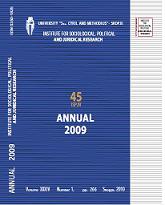Direct Presidential Elections in the Republic of Macedonia, Yes or No
Direct Presidential Elections in the Republic of Macedonia, Yes or No
Author(s): Natasha Gaber-Damjanovska, Aneta JovevskaSubject(s): Politics / Political Sciences
Published by: Институт за социолошки и политичко-правни истражувања
Keywords: presidential elections; electoral system; legitimacy
Summary/Abstract: It is usual for our scientific audience to take interest in the election processes, but only in the area of the parliamentary elections and their outcome. The possible reason for this could be the numerous controversis that followed these elections. In cotrast, the interest for the presidential elections was more of a trigger for clashes between parties, rather than a reason for a serious scientific analysis. In the meantime, with the amandment of Article 31 from the Constitution of the Republic of Macedonia in 2008, as well as with the last presdiential elections, certain aspects that deserve attention of the scientific audience have been actualized yet again. The constitutioanl position of the President further emphasizes the actualisation of the method by which a President is elected, by general and direct elections, which by itself implies even greater accreditations and power which this titleholder has. Although as a formality, these powers are limited and to an extent sublimed to ceremonial rites, nevertheless, if he/she has leadership capacities, a President can extent his/hers influence on the general public and support the reformational processes which are taking place in the state. In absence of such capacities, or in the presence of a strive to impose politics that don't communicate with the interest of the citizens, such limitations of authority act as a counterweight to the proclaimed aspirationa of power. At the same time, the legitimacy of the President is closely conected to this issue, related to the needed census quotas in the second round of elections. Namely, the reduction of the cesus correspondents to the actual climate in the Republic of Macedonia, but keeping in mind the trend of electoral behavior, there should be an open option for unsuccessful realization of the electoral process, helped by the electoral abstinence. Therefore, this type of resolutions should be analyzed from the aspect of the current political context, as well as the effects expected to be fulfilled by such conceptualized model. At the same time, the next presidential elections will be facing yet another challenge in the participation of the diaspora. The operational issues related to logistics and voting techniques set aside, this issue is expected to produce numerous disputes, because the diaspora votes could be crucial in winning the elections.
Journal: Annual of the Institute for Sociological, Political and Juridical Research
- Issue Year: XXXIV/2009
- Issue No: 1
- Page Range: 123-137
- Page Count: 15
- Language: English

